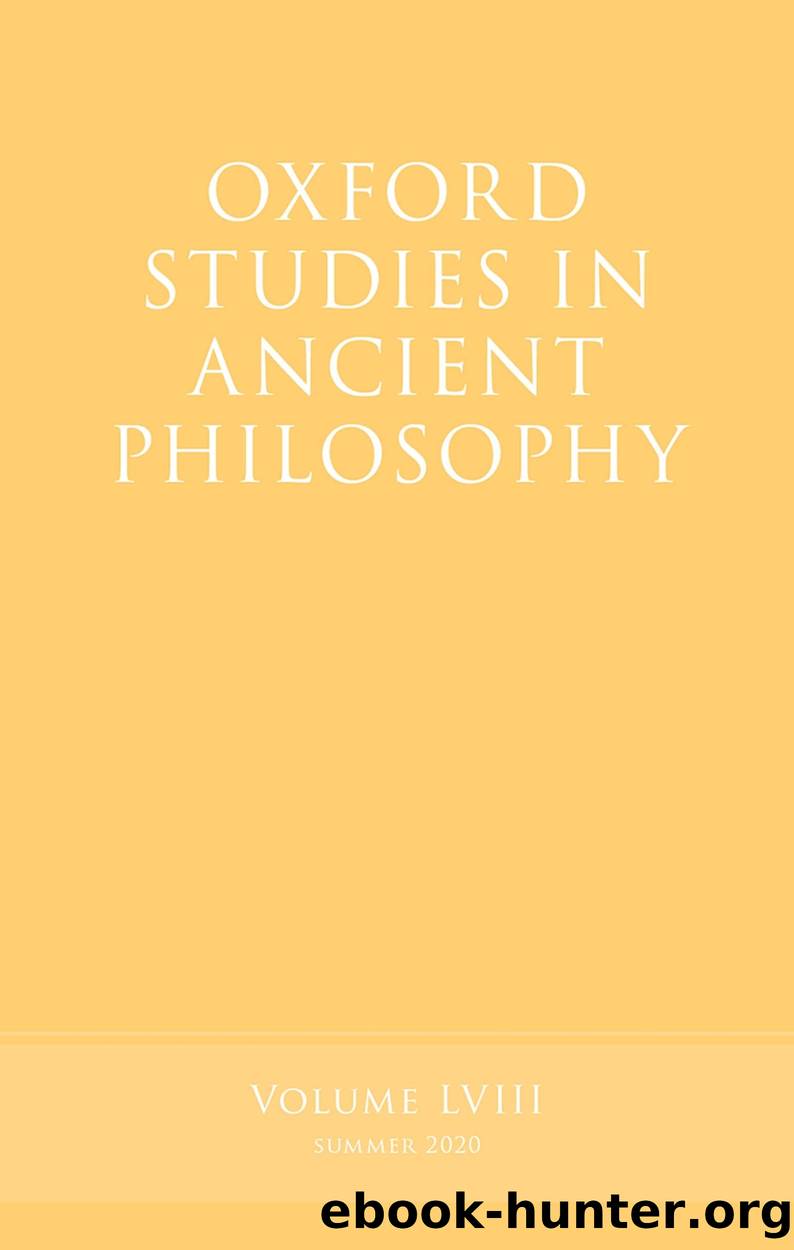Oxford Studies in Ancient Philosophy, Volume 58 by Victor Caston;

Author:Victor Caston; [Caston, Victor]
Language: eng
Format: epub
ISBN: 9780192602725
Publisher: OUP Premium
Published: 2020-11-07T00:00:00+00:00
2. Spontaneous generation and spontaneous causation
Further philosophical support for an approach that emphasizes process types can be obtained by reflecting on the puzzle about whether spontaneous generation is spontaneously caused (in the Physics 2 sense). Understood correctly, this puzzle is closely connected with the issue of what types it belongs to. Physics 2. 4â6 offers several conditions for spontaneous causation. I focus on three. First, spontaneous proceedings happen âneither ⦠always nor for the most partâ (οá½Ïε ⦠αἰεὶ οá½Ïε á½¡Ï á¼Ïὶ Ïὸ ÏολÏ)âwhich I abbreviate as ârarelyâ.21 Second, they are accidentally caused.22 These conditions are related, and 2. 4â6 often substitutes one for the other. 2. 5, for instance, locates spontaneous proceedings âin the class of things outside of what is necessary and for the most partâ (á¼Î½ Ïοá¿Ï ÏαÏá½° Ïὸ á¼Î½Î±Î³ÎºÎ±á¿Î¿Î½ καὶ Ïὸ á½¡Ï á¼Ïὶ ÏολÏ) and specifically those that can be âfor the sake of somethingâ (á¼Î½ÎµÎºÎ¬ ÏÎ¿Ï , 196b19â21). It later offers roughly the same definition, substituting accidental causation for happening rarely: âchance is an accidental cause in the class of things that are in accord with choice, among the things that are for the sake of somethingâ (197a5â6).23 It is thus plausible to think spontaneous proceedings happen rarely because they are accidentally caused.24 Moreoverâthis is the third conditionâthey are among things that are for the sake of something (196b33).
My argument is that to determine whether spontaneous generation meets these conditions, we need to know which process types are involved in it. I begin with the requirement that spontaneous proceedings happen rarely and accidentally. These conditions concern types. It makes no sense to say that an individual happens rarely. Rather, what is rare is occurrences of some type. Moreover, different ways of specifying these types yield different determinations about whether something counts as happening rarely and as accidentally caused. Consider Aristotleâs example in Physics 2. 5: the housebuilding craft is a proper cause of a house, but the musical is an accidental cause (2. 5, 196b24â9). The housebuilding craft and the housebuilding process it causes are of a type that is non-accidentally related to the house type, but the musical type is accidentally related to it. Metaphysics Î. 2 offers an example with a slightly different structure, closer to what we will find in spontaneous generation: a pastry chef who aims at producing sweet pastries and also, accidentally, produces health (1027a3â5). The chefâs pastry-making craft aims at making sweet pastries and so it is the non-accidental cause of the sweet pastry, insofar as it is a sweet pastry. However, this craft is only accidentally the cause of a healthy thing, when it just so happens that this sweet pastry is also healthy. As before, the point is that saying that this is a case of accidental causationâand that cases like it happen rarelyâdepends on identifying the pastry as belonging to two types: the healthy one and the sweet one. If the types were different, these might not be examples of accidental causation (or things that happen rarely).
Download
This site does not store any files on its server. We only index and link to content provided by other sites. Please contact the content providers to delete copyright contents if any and email us, we'll remove relevant links or contents immediately.
Verus Israel: Study of the Relations Between Christians and Jews in the Roman Empire, AD 135-425 by Marcel Simon(550)
Infocracy by Byung-Chul Han(535)
Caesar Rules: The Emperor in the Changing Roman World (c. 50 BC â AD 565) by Olivier Hekster(528)
Europe, Strategy and Armed Forces by Sven Biscop Jo Coelmont(477)
Banned in the U.S.A. : A Reference Guide to Book Censorship in Schools and Public Libraries by Herbert N. Foerstel(444)
Reading Colonial Japan by Mason Michele;Lee Helen;(441)
The Roman World 44 BC-AD 180 by Martin Goodman(436)
Give Me Liberty, Seventh Edition by Foner Eric & DuVal Kathleen & McGirr Lisa(435)
DS001-THE MAN OF BRONZE by J.R.A(419)
The Dangerous Life and Ideas of Diogenes the Cynic by Jean-Manuel Roubineau(417)
The Oxford History of World War II by Richard Overy(414)
Introducing Christian Ethics by Samuel Wells and Ben Quash with Rebekah Eklund(410)
american english file 1 student book 3rd edition by Unknown(409)
Imperial Rome AD 193 - 284 by Ando Clifford(408)
Basic japanese A grammar and workbook by Unknown(388)
Literary Mathematics by Michael Gavin;(373)
Language Hacking Mandarin by Benny Lewis & Dr. Licheng Gu(351)
How to Reach the 9.0 in IELTS Academic Reading by IELTS Medical(333)
The Oxford History of the Renaissance by Campbell Gordon;(331)
